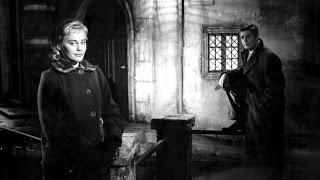
"Never trust anyone, especially if they are in love."
After the overblown Senso (1954), Luchino Visconti returned more measured material. Le Notti Bianche (1957) updates Dostoyevsky's White Nights to postwar Italy, an achingly beautiful exploration of love.Two lost souls meet on a Venice bridge. Mario (Marcello Mastroianni) is a transplanted newcomer from the countryside. Natalia (Maria Schell) is reclusive, dominated by her mother and pining after her lost love (Jean Marais). The two meet over the course of several nights, Natalia reluctant to return Mario's affection. She insists that her lover will return, but can't help growing closer to Mario.
Le Notti Bianche trades Senso's Technicolor spectacle for black-and-white, yet stands even further from reality. Visconti shoots within a Cinecitta soundstage, emphasizing its artificiality with Giuseppe Rotunno's crane shots and zooms. He shows airy gray sky trickling snow, bright streets and picturesque canals alternating with smoky bars and alleys hosting vagrants and prostitutes. One striking edit pans from Natalia and Mario chatting to a flashback of her last meeting with her lover, within the same shot.
This marks a visual component to Visconti's romantic cynicism. Natalia's stories play like a fairy tale, even though Visconti shoots her beau in the shadows, a handsome cipher intimating a criminal past. She harbors conflicting desires for tangible friendship and true love, returning to the same street corner each night. While she attends opera with her lover, she awkwardly dances with Mario in a bar playing Bill Haley and the Comets. In her flashbacks Natalia speaks only in narration, her self-image as ephemeral as everything else.
Mario finds Natalia lovely but exasperating, obsessed with her fantasies and indifferent to his own. While he tries recounting his own interests, Natalia's distracted by dancing patrons. Visconti plays these scenes with a light touch unusual for him; it's a charmingly awkward date recalling Marty's well-matched misfits. When she finally opens up to him, a snowstorm conferring Heaven's blessing. Then comes a climactic gut punch that unravels everything.
Marcello Mastroianni is fine as always, playing Mario's exasperation as humorous and heartwarming, tragic when needed. But Maria Schell dominates the show. Her Natalia could seem flighty or ridiculous, but Schell's warm smile, naked emotion and vulnerability sell her foibles. Jean Marais seems as menacing as romantic in his flashbacks; Clara Calamai plays a prostitute who tricks Mario into an ill-fated tryst.
Ultimately, Le Notti Bianche's tragedy is mainly Mario's. If Natalia seems deluded, Mario imagines their relationship as romance, setting himself up for disappointment. Visconti shows his exit in long shot as a friendly dog accosts him, scant consolation for his dashed moment of happiness.

